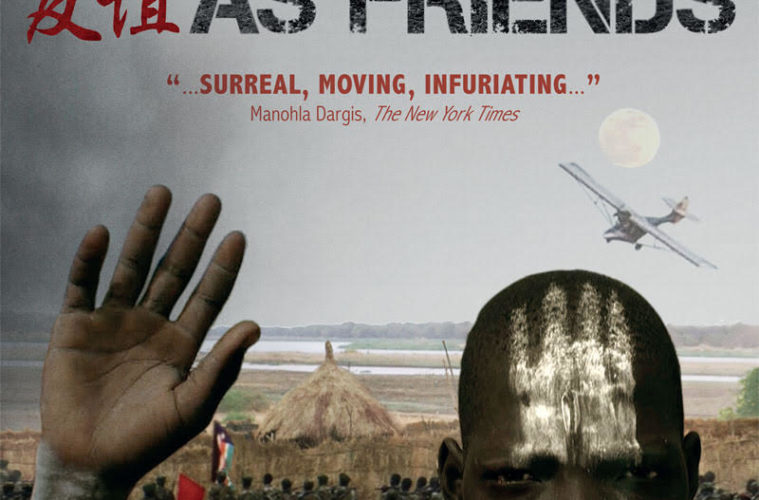As a child, flipping through the pages of a National Geographic Magazine often allowed me the privileged position of imagining what it might be like to live in an African tribe. The experience was less about escapism than it was cultural tourism; one filled with judgment from my less sensitive and educated, younger self. I had been culturally programmed to see tribal, naked people as “uncivilized” and I remember thinking “If only we could show them our way of life.”
Hubert Sauper’s newest anti-colonialism documentary We Come as Friends, a spiritual follow-up to his much-championed Darwin’s Nightmare, begins similarly to my childhood explorations. A naked child speeds past the camera, clutching a bottle of water, smile blazing for all to see. We are left to wonder who this child is and where he got the bottle. Suddenly Sauper tosses audiences into the sky on the back of a homemade prop plane that he’s piloting over the South Sudanese countryside. The flat landscape is stunning in its rawness, pockmarked by signs of civilization and cast in the vibrant colors of twilight.

We Come as Friends is a collection of narratives assembled from over six years of footage taken by Sauper as he piloted his two-man plane over South Sudan. These short glimpse in the lives of the South Sudanese people paint a clear depiction of the warring forces between the country’s desire for independence and freedom with that of the West’s colonial forces exploiting the resources of the country. Instead of laying out the political climate and regional history, Sauper invites audiences to view the conflict through his context-free cinema verite style. At times this choice can seem aimless, but Sauper’s anti-colonial narrative becomes clear as the countless images of despair and stone-faced indifference pile up.
We Come as Friends depicts the destructive forces of colonialism in South Sudan in the bluntest of ways, to its benefit. In one particularly memorable sequence, a group of missionaries from Texas are shown forcing shoes and socks on local children’s feet as they kick and scream, all in an attempt to create what their interpretation of the Bible calls a “New Texas.” Later when that same group is questioned about acquiring their land, they coldly state, “The Toposas don’t understand property ownership the way you and I do.” They’ve erected white-picket fences around their property and when the Toposas tell them that the goats use that land to eat, they suggest that perhaps the goats can just eat somewhere else.

We Come as Friends is stuffed full of similarly depressing and infuriating sequences; whether it be an oil company’s poisoning of a tribe’s only water source, the displacement of homes, or the casual dismissal of a wasteland of trash buildup. All this is punctuated with chilling footage of politicians (Hillary Clinton’s assertion that she hopes that “the Africans will profit” seems ludicrous in this context), celebrities, and other Westerners who approach South Sudan as if it were another planet. A group of Chinese oil workers watch countless science-fiction films on their computers and make a comparison between the aliens and the local inhabitants, who have been displaced by their state-of-the-art facilities.
Despite the film’s unstructured message, We Come as Friends paints a well-defined and complicated portrait of an African country reaching for freedom and independence that will remain unattainable so long as outside forces have a desire to ravage its resources for financial gain. In the film’s final moments Sauper records the instant that a village elder is told that he signed away his people’s land for the small sum of $25,000 purely because he didn’t understand the nature of the deal. The real kick of it is that the man fought to protect his land against the Sudanese advances for decades only to be undermined by his signature right as his country gained its independence. We Come as Friends’ South Sudan is a country, like many others in Africa, which gained its freedom only to be imprisoned by additional bars and chains.
We Come as Friends opens on Friday, August 14th.

